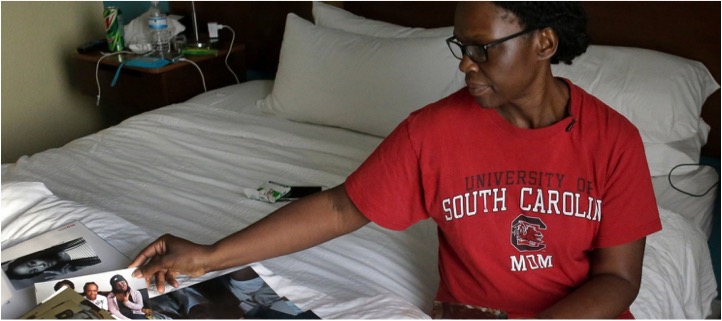“Hatred will find a way to destroy you, so we forgive the shooter.” Shepherd Drayton, whose daughter Deonka was killed at the Pulse nightclub in Orlando early this past Sunday morning.
“If the man who killed my sister was looking for hate — he came to the wrong place.” Bethane Middleton-Brown, whose sister, the Rev. DePayne Middleton Doctor, was killed at Emmanuel AME Church in Charleston one year ago today.
“The man accused of killing my mother did not show any remorse. Why should I feel the need to forgive him when he has not asked for forgiveness?” Sharon Risher, whose mother, Ethel Lance, was killed at Emmanuel AME Church in Charleston one year ago today.
One year ago today, Dylan Roof walked into a Bible study group at Emmanuel African Methodist Episcopal Church in Charleston, South Carolina. He stayed for an hour and then pulled out his gun and killed nine of the ten members of the group. “I almost didn’t go through with it because everyone was so nice to me,” he is reported to have said.
Five days ago, Omar Mateen walked into the Pulse, a gay nightclub in Orlando, Florida, with a semi-automatic rifle and a handgun. He opened fire and killed 49 patrons and injured 53 others. Mateen was killed by police officers in a final exchange of gunfire.
Among the family members of the victims of Charleston and Orlando are those such as Shepherd Drayton and Bethane Middleton-Brown, who quickly offered forgiveness to the murderer of their loved one. Others like Sharon Risher have found forgiveness harder to come by. While many have commended the words of forgiveness spoken by the family members of the victims, some have criticized and condemned the very idea of forgiveness in a world as driven by hate as ours.
As we remember the Charleston shootings today and try still to understand the Orlando shootings, the power and the difficulty of forgiveness lurk at the edge of our thoughts, our prayers, and our responses. As much as we commend Shepherd Drayton and Bethane Middleton-Brown, we cannot condemn Sharon Risher whose words echo our own deep thoughts all too often.
At the end of the post I have linked the Washington Post stories that quote Shepherd Drayton and Bethane Middleton-Brown and the Vox column by Sharon Risher. Also linked is a longer piece from the current issue of Christianity Today that allows us to hear the voices of some of the family members of the victims of the Charleston murders. Spend some time this weekend reading them.
Forgiveness is not easy, whether expressed immediately or still fought a long time later. As the Christianity Today articles points out, “But while the trauma is not over, neither is the grace. Any forgiveness worth the name is a long obedience in the same direction. To extend forgiveness aloud is less to describe a finished reality than to commit to a personal journey—whether or not the offender ever joins you.”
Certainly Sharon Risher is right when she says that forgiveness does not preclude action or hard and long work to right the wrongs that brought the pain. But Risher struggles with the reality that forgiveness can neither demand nor expect apologies or repentance. Perhaps that is what makes it so difficult. I am required to do the work of forgiveness while the perpetrator of hurt and violence, death and destruction, may still harbor his hate – or has been killed before the possibility of any restitution. Forgiveness often asks us to surrender our right to justice.
I have not lost a loved one to hatred and violence. I would be the fool to say that I understand what those who have lost so much in Charleston and Orlando are going through. But that is not to say that my losses, your losses, and the hurt I, and you, have experienced from hate in any of its many forms don’t matter. Or that they require any less forgiveness from us. Or that forgiveness will be easy.
Forgiveness is required, not optional, for the Christian. “As the Lord has forgiven you, so you also must forgive,” Paul tells the Colossians (3:13).
Forgiveness, as difficult as it is for us, is demanded of us, and, yes, of those who lost so much in Charleston and Orlando. “Anger was in me and there was no place to release it. Forgiveness was the way to release it,” Shepherd Drayton said.
When I have been wronged, forgiveness seems inadequate and unfair. It will be criticized and condemned by some, maybe many. But Shepherd Drayton is also right when he says, “Hatred will find a way to destroy you, so we forgive…”
Hatred is destroying our nation. Each of us must repent of our hatred, a difficult task. We must forgive the hater, an impossible task save for the grace of God in Christ Jesus. Forgiveness is a long obedience in the same direction.
Forgiveness does not preclude action and response, working out the still more excellent way of love with fear and trembling. But it is the first and necessary first step toward healing. It is an answer to our prayer that God’s Kingdom come and his will be done.
The journey to forgiveness can be long; we wonder if it will ever reach its destination. I am on a journey to forgiveness, halting, sometimes turning back, sometimes frightened by the power of hate which will destroy. Some of those I must forgive are in the fellowship of Christ’s church, perhaps unaware of the grudge I bear or the hurt they brought into my life – and, yes, the hurt was real.
Forgiveness. Simple. Naïve. The hardest thing in life. Yet the only way to defeat hate.
See you Sunday.
The Washington Post on the Charleston Families

